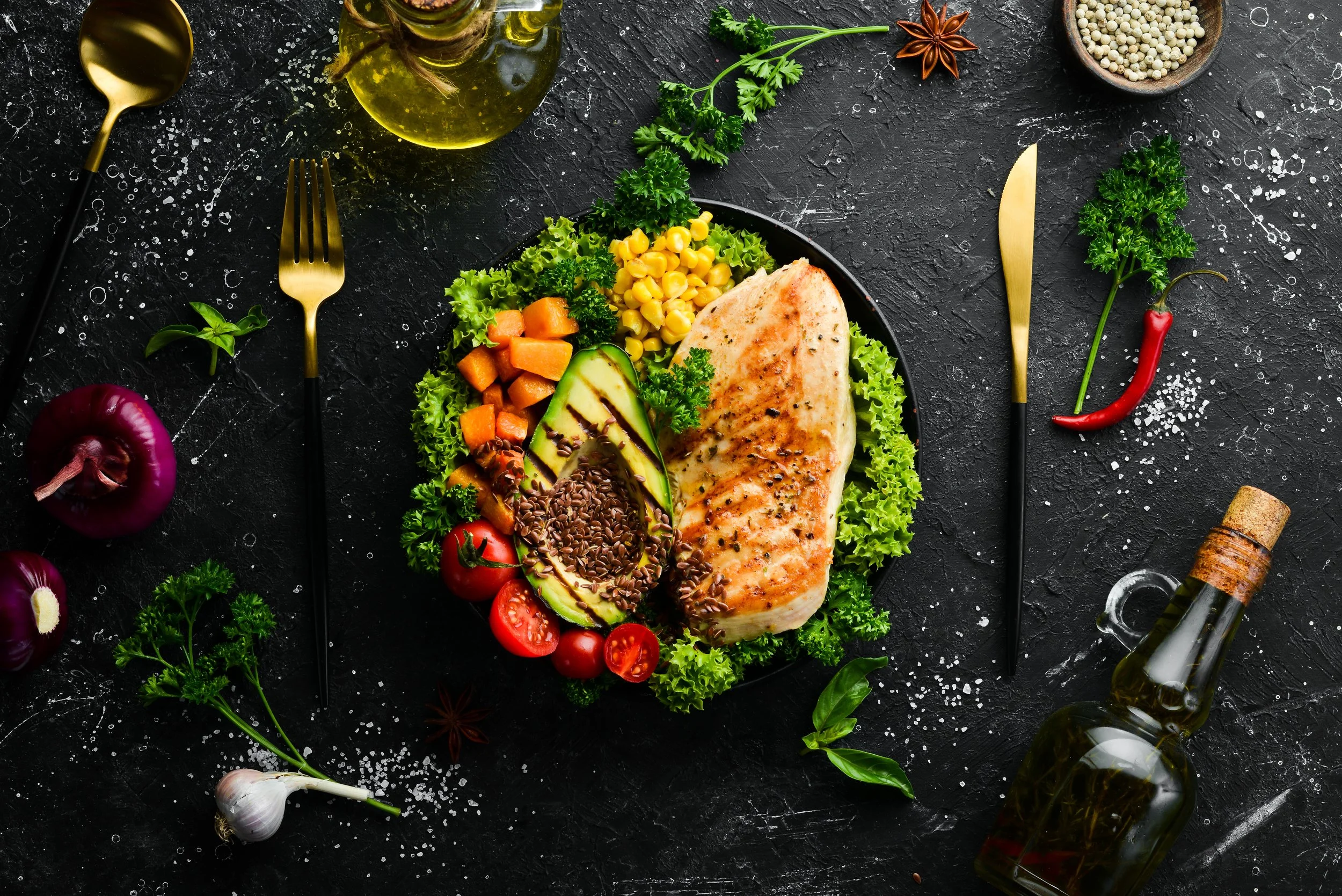7 Easy Tips for Healthy Holiday Eating
December celebrations are just around the corner, and with them a feast of rich, festive meals that can make it tricky to stick to your healthy eating goals.
But here’s the good news: with a few simple tricks, you can absolutely enjoy the season without feeling deprived – and it can be done with ease!
Here are 7 super easy, practical tips to help you navigate holiday meals while keeping your well-being in check as we glide into the New Year.
Get ready to celebrate smartly and savour every moment!
(1) DON’T SAVE YOURSELF FOR THE BIG MEAL
Not eating the whole day because you have a big family dinner coming up and want to save the calories for those mouth-watering deserts is a common habit during December holidays.
But, it is also counter-productive.
When you save yourself for the big holiday meal you’re not only more likely to overeat at that meal, but you’re also more probably going to end up making less healthy food choices, e.g. filling our plates with more desserts than you’d normally do.
Not eating regularly and then overindulging at that big meal can also destabilise your blood sugar, which then leads to mood and energy swings, excessive hunger as well as further sugar cravings and more unhealthy eating.
So rather than “saving the calories” for the big dinner, eat 5 balanced meals during the day, every day, during the holiday period. This will help you stabilise your blood sugar, prevent sugar cravings and reduce the need to overindulge at those special meals.
(2) FILL 1/3 OF YOUR PLATE WITH NON-STARCHY VEGGIES AND EAT THEM FIRST
Non-starchy veggies (i.e. those that grow above the ground such as tomatoes, peppers, broccoli, spinach, green beans, etc.) are rich in fibre, which helps you feel fuller for longer and reduce the chance of overeating.
If you eat them first before indulging in other dishes, fibre also has a much greater, positive impact on your blood sugar, which is important not only for reducing the sugar cravings later in the day, but also for helping you maintain a healthy weight.
(3) HAVE A TREAT — BUT SAVE IT FOR AFTER THE MEAL
When it comes to enjoying your favourite holiday treats, timing is everything! When you eat a sweet treat on an empty stomach or as a replacement for a meal, this can spike your blood sugar and send it on a rollercoaster.
However, when you enjoy it as a dessert after a balanced meal that’s rich in fibre and protein, your system is able to handle all that sugar much more smoothly - and that also means less impact on your energy levels, mood and sugar cravings down the line.
(4) MAKE SURE YOUR BODY DOESN’T MISTAKE THIRST FOR HUNGER
It might sound strange, but it probably happens to all of us more often than we know: as clever as our bodies are, they can confuse thirst for hunger, making us eat more food, when we should actually simply drink a glass of water.
That’s because the part of the brain that’s responsible for interpreting hunger signals is also translating thirst signals, and sometimes these messages get mixed up.
Research also shows that eating a lot of high-fat and high-sugar foods (which December is of course full of) can dull our sensitivity to thirst, making it harder to tell when we need water instead of food.
To prevent this from happening, calculate the basic fluid amount your body needs (weight in kg x 30 ml), and consume it in small amounts throughout the day. Prioritise water and unsweetened herbal tea and stay away from sweetened drinks as much as you can.
(5) BAKE WITH FRUIT INSTEAD OF SUGAR
My favourite sugar replacements are ripe bananas and dates.
These two nutrition superstars not only preserve the delicious sweetness that you’re after, but they also pack a powerful nutritional punch. Bananas bring potassium, magnesium and a creamy texture, while dates offer rich caramel-like sweetness, fibre, and vitamin B6.
So incorporating these two in your baked goods not only satisfies your sweet tooth but also boosts your nutritional intake.
(6) SLEEP AT LEAST 8 HOURS A NIGHT
When we sleep less than 7 hours a night, our body changes the way it releases the hormones that control our appetite, making us more hungry than we would otherwise be, and reducing our satiety after a meal.
Lack of sleep also worsens cravings for processed and sugary foods,
so sleeping enough during the holidays will help reduce the desire for all those sweets and make sure that we can stay on track with healthy eating during the festive season too.
(7) LEARN TO SAY NO WITHOUT GUILT
When you're at social festive events and get offered food or drinks that don’t align with your goals, it’s perfectly okay to say no. A simple and polite way to do this is by using the phrase “Maybe later.”
This keeps things friendly and non-committal, allowing you to enjoy the moment without pressure. If you decide you want that treat later, go for it! If not, people often forget about it anyway.
Remember, it’s all about enjoying the festive season while staying true to what feels right for you.
Cheers to a joyful and balanced holiday season!




